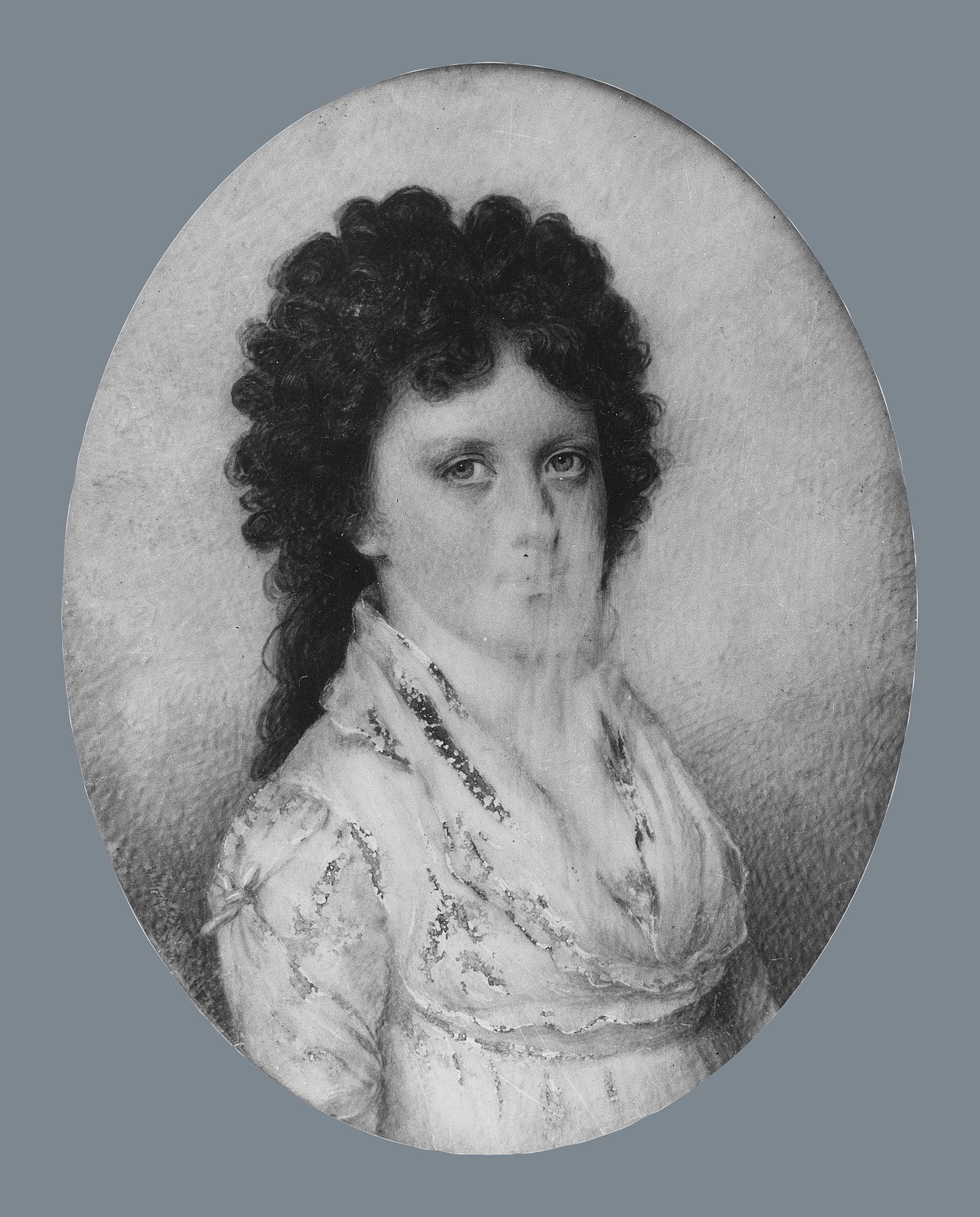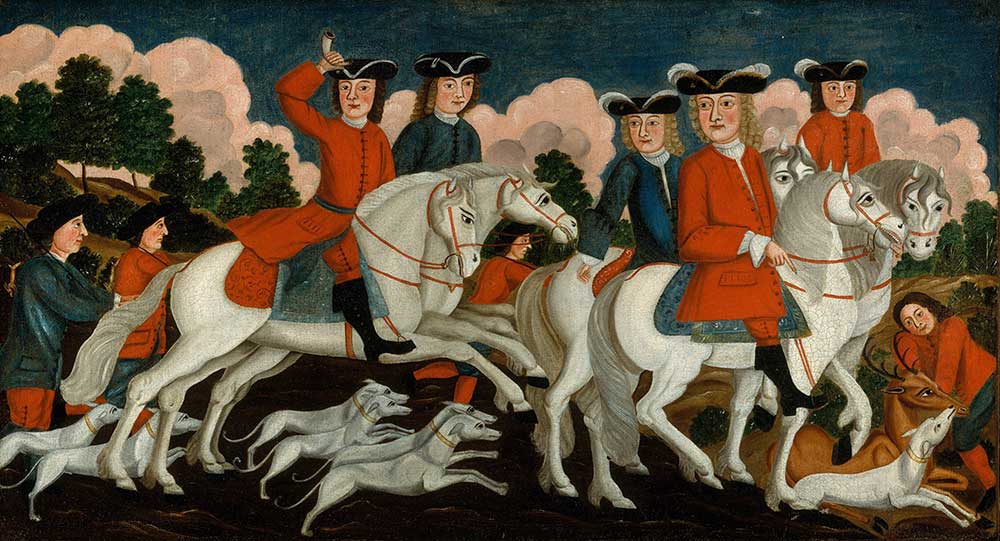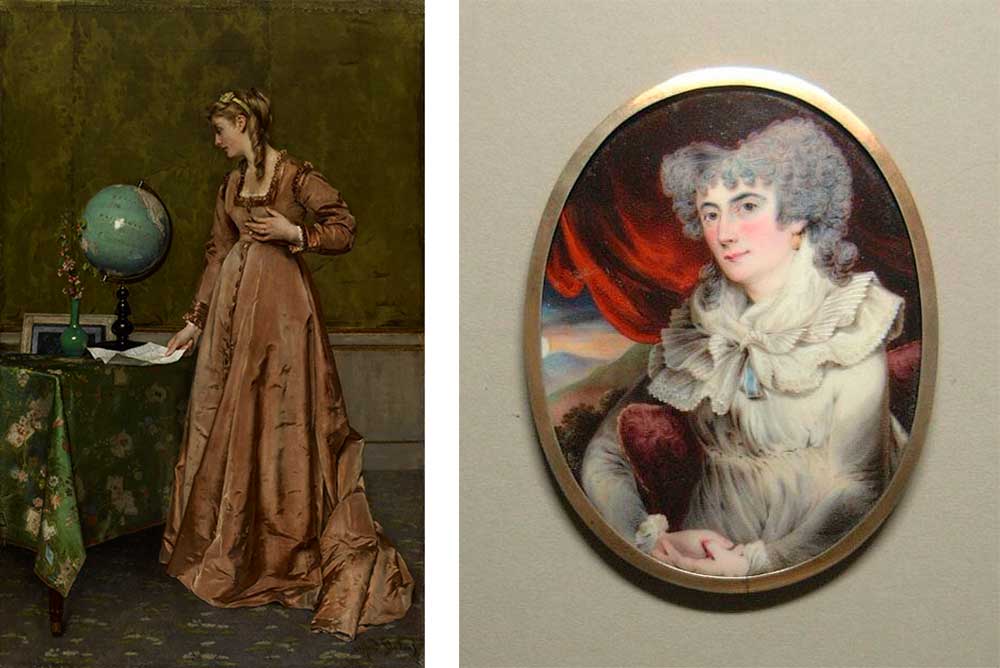
Myra Eliot, by Edward Greene Malbone, c. 1798. The Metropolitan Museum of Art, bequest of Edward Walden Forrest, 1927.
Jan Ellen Lewis was neither a Virginia historian nor Jeffersonian scholar. She turned to Virginia and to Thomas Jefferson as an American historian determined to find fresh ways to think about our country’s troubled history. Her gifts as a cultural historian enabled her to move beyond the constraints of quantitative social history and of the text-bound study of ideology.
In “Jefferson and Women” (2010), excerpted below, Lewis explains what was at stake in maintaining a stable republican domestic order. Emphasizing the biographical imperative to situate her subject in his proper spatial and temporal contexts, she argues persuasively that his misogynistic outbursts reflect critical moments in his private life and public career. From our contemporary perch, it is too easy to look at Jefferson’s actions, read his words, and conclude that he feared and hated women: the low-hanging fruit is there to prove it! The more interesting question is: When and why did Jefferson feel prompted or compelled to express such ubiquitous sentiments? Lewis identifies two misogynistic periods in his life: first, in his adolescence, when he clearly did not know what to make of women and bonded with other anxious males; and second, in his years in Paris, when he again found women intimidating and feared their corrupting influence on politics. The latter fixation carried over to the party battles of the 1790s, when the new republic seemed under siege from internal enemies: republican government was, indeed, gendered male. But it does not follow that Jefferson hated women or exceeded the misogyny of his time. It was instead the unthinkable prospect of female autonomy and power unbounded by the constraints of domesticity that so frightened him, both as an anxious young man and as a republican statesman. For Jefferson, domesticity, individual self-discipline (for men as well as women), and republican self-government were inextricably linked. We can now say we know that the women at Monticello paid a high price for Jefferson’s happiness. But they were by no means merely his victims.
—Annette Gordon-Reed and Peter S. Onuf

Thomas Jefferson’s attitudes about women were remarkably conventional, so conventional, for the most part, that to describe them is essentially to provide an account of the standard views about sexual difference and women’s roles held by men of his time, place, and social standing.
In the letters Jefferson exchanged with his friends, filled with chatter about young women, he was trying out and trying to make sense of the world of heterosexual relations. As historian Joanne B. Freeman has noted, Jefferson was an avid gossip, and, if the chitchat about who was courting whom did not serve as “conduits for other people’s aggression” in the way that political gossip did, it certainly revealed an underlying anxiety about who was getting ahead and who was being left behind. And, as he would later, when insisting that he was sick and tired of politics and wanted nothing more than to retire to his mountaintop, from time to time Jefferson proclaimed himself weary of the whole enterprise of courting the ladies. In one of his more gossipy letters (“You have heard I suppose that J. Page is courting Fanny Burwell. W. Bland, and Betsy Yates are to be married thursday se’nnight”), Jefferson denied not only that he was a gossip (“Who told you that I reported you was courting Miss Dandridge and Miss Dangerfeild?”) but that he even planned to marry. “Many and great are the comforts of a single state.” True, “St. Paul…says that it is better to be married than to burn. Now I presume,” Jefferson joked, “that if that apostle had known that providence would at an after day be so kind to any particular set of people as to furnish them with other means of extinguishing their fire than those of matrimony, he would have earnestly recommended them to their practice.” Who needed to court young heiresses when more willing women could be had for a considerably lower price? In this gossipy letter, Jefferson’s anxieties about the mercenary nature of the relationship between the sexes came through.
Once he married, Jefferson’s anxieties about sex and gender abated, and he soon made his stunning entrance on the political scene. By marrying a beautiful and affluent young woman, Jefferson was able to settle down, in several senses of the term. Whatever his earlier anxieties about marrying, he found great joy in domesticity, and it became for him, even after his wife’s death, the measure of human happiness. Jefferson moved, then, from a kind of conventional misogyny to a kind of conventional valorization of domesticity. We see this appreciation for the domestic life not only in Jefferson’s reminiscences about his married life but also in his subsequent contrast of the satisfactions of private life and the pure and unabated miseries of the public sphere. Not only was his marriage one of “unchequered happiness,” but his wife’s death in “a single event wiped away all my plans and left me a blank which I had not the spirits to fill up.” Twenty years earlier, the anxieties of courtship had left Jefferson depressed and listless; now it was the death of his beloved wife. Jefferson had grown up.
Jefferson carried this image of happy domestic life with him for the rest of his days; it became a touchstone for him. Jefferson’s comparisons of the miseries of public service with the rewards of family life are too well known to require more than a brief mention. “It is in the love of one’s family only,” he once told his younger daughter, “that heartfelt happiness is known.” In government, he found “every thing which can be disgusting,” at home with his family, “every thing which is pleasurable to me.” His protestations notwithstanding, Jefferson spent most of his adult life in public service; his family—and his idea of family, as those who knew his real self and as his only source of “heartfelt happiness”—anchored him, making his public service possible. Jefferson’s views about family life were wholly conventional, and a happy marriage enabled Jefferson to shed his early misogyny, or at least rub off its sharp edges.
Jefferson’s misogyny percolated to the surface when he was in France, between 1784 and 1789, serving as the new nation’s minister. He was single, engaged in an intense flirtation with the unhappily married artist Maria Cosway and perhaps beginning what would turn out to be a long liaison with his slave Sally Hemings. Whether owing to his own unsettled domestic life, or because he was living in a foreign culture, or some combination of the two, Jefferson had a lot to say about women, in particular about their appropriate roles in society. Some of these comments reveal, if not a streak of misogyny, at least an anxiety about female sexuality and the risks that it posed for both the male body and the body politic.
Jefferson made it quite clear to anyone who asked that Europe was no place for a young man. The only question was how old he had to be before he could travel safely. John and Abigail Adams’ daughter Nabby (Abigail) remembered Jefferson’s saying that “no man was fit to come abroad until thirty-five,” while he told Walker Maury that “no American should come to Europe under thirty years of age.” He told Charles Thomson that he did not know “one good purpose on earth which can be effected by a young gentleman’s coming here.” He worried in particular about one of their young friends. “I am in hopes he is discreet and that you need not fear the corruption of his morals.” Jefferson worried that such young men might form “a connection, as is the fashion here, which he might be unwilling to shake off when it shall be proper for him to return to his own country [Is that what Jefferson did with Maria Cosway, shake her off?] and which might detain him disadvantageously here.” The temptations of Paris, “where beauty is a begging in every street,” were often too great. The problem, quite obviously, was women, beautiful women. One sees here a glimmer of the young Jefferson, concerned that men make appropriate marriages in America. A European dalliance—a European woman—might get in the way.
Jefferson warned young men directly and even more explicitly. When John Banister Jr. asked Jefferson’s advice about where to study in Europe, Jefferson told him to go to William and Mary. England, with its “drinking, horseracing and boxing,” was bad enough, but the rest of Europe was even worse. There a young man “is led by the strongest of all the human passions into a spirit for female intrigue destructive of his own and others happiness, or a passion for whores destructive of his health.” Moreover, “in both cases,” he “learns to consider fidelity to the marriage bed as an ungentlemanly practice and inconsistent with happiness.” And, once again, the fundamental threat comes from women, as the young man “recollects the voluptuary dress and arts of the European women and pities and despises the chaste affections and simplicity of those of his own country.” Jefferson told Maury that a young man could not come to Europe without threat to his “virtue…health, and…happiness.” One cannot help thinking that Jefferson himself must have been sorely tempted. For our purposes here, what is more important is the intensity of Jefferson’s feeling that beautiful European temptresses threatened the happiness and health of young American men. The fault was entirely with the women.
This sort of misogyny was not unusual. It was, as political theorist Hanna Fenichel Pitkin has pointed out, a staple of republican thought. Although Jefferson’s political thought was in many ways fundamentally liberal—his belief in the superiority of private life, for example—it also incorporated a misogynist streak, one that he expressed in republican terms. This misogyny, I have tried to suggest, became most pronounced in those periods in his life when he was unattached and either beset by or perhaps was himself besetting women. When he was in France, it became embedded in a republican critique of monarchy. If we return to Jefferson’s letter to Banister, we can see how the pieces fit together. When a young American man such as Banister goes to Europe, Jefferson warned, “he is fascinated with the privileges of the European aristocrats, and sees with abhorrence the lovely equality which the poor enjoys with the rich in his own country: he contracts a partiality for aristocracy or monarchy.” While acquiring manners that were superficially pleasing, the young man “acquires a fondness for European luxury and dissipation and a contempt for the simplicity of his own country.” And, of course, “he is led by the strongest of all the human passions into a spirit for female intrigue…or a passion for whores.” Hence, aristocracy was seductive and whorish, and seductive women were aristocratic: aristocracy, luxury, dissipation, and women who will destroy a man’s health and happiness are all of a piece.

Jefferson’s critique of the Old World was deeply gendered, which meant that he could not help depicting America as a gender utopia. In a well-known letter to Anne Willing Bingham, a beautiful young woman who was married to one of the wealthiest men in Philadelphia, he compared the “empty bustle of Paris” with the “tranquil pleasures of America,” each of which he embodied as a woman. In Paris, “Madame” was lucky to make it out of bed before noon, perhaps squeezing in a little visiting before having her hair done. Then came more visiting, supper, and, after that, “cards; and after cards bed; to rise at noon the next day, and to tread, like a mill horse, the same trodden circle over again. Thus the days of life are consumed, one by one, without an object beyond the present moment.” Jefferson drew a contrast with America, where—and remember that he was writing to one of his country’s wealthiest women—“the society of your husband, the fond cares for the children, the arrangements of the house, the improvements of the grounds, fill every moment with a healthy and a useful activity.” Utility was the measure of a healthy society, and utility consisted in serving the needs of a woman’s family and her social circle more generally. Proper gender relations made American society properly bourgeois. “The intervals of leisure are filled by the society of real friends, whose affections are not thinned to cobweb, by being spread over a thousand objects.” Here Jefferson set out a vision of the properly functioning society and made women its anchor. “Be you my dear,” Jefferson once instructed his elder daughter, not yet twenty years old and just married into a family beset by turmoil, “the link of love, union, and peace for the whole family.”
Jefferson was working toward a conventional understanding of sex roles, one that assigned politics to men and domestic life to women. This gendered order was also a cornerstone of Jefferson’s politics and his political economy as well. Let us begin with his politics. Jefferson took it as a given that women did not belong in politics. In France, he complained to Bingham in the spring of 1788, “All the world is now politically mad. Men, women, children talk nothing else…The women of this capital, some on foot, some on horses, and some in carriages hunting pleasure in the streets, in routs and assemblies, and forgetting that they have left it behind them in their nurseries.” This was pandemonium. The contrast between the Parisian women and American ones, who “have the good sense to value domestic happiness above all other,” was “a comparison of Amazons and Angels.”
Jefferson’s tone with his female friend was lighthearted; he no doubt thought he was being pleasant, perhaps even flirtatious. When he brought up the same subject with George Washington half a year later, however, the tone was serious. Jefferson was troubled by “the influence of women in the government.” As France moved toward revolution, he worried—and remember that he is writing to the man who will shortly become the first president of the United States—that French attempts at reform would come to naught because of it. “The manners of the nation allow them to visit, alone, all persons in office, to solicit the affairs of the husband, family, or friends.” He had no such worries for his own country, in which, “fortunately for the happiness of the sex itself,” female influence “does not endeavor to extend itself in our country beyond the domestic line.” In political life as in social, the United States was a gender utopia, a new and improved world, for men, and, Jefferson thought, for women, also.
Excerpted from Family, Slavery, and Love in the Early American Republic: The Essays of Jan Ellen Lewis edited by Barry Bienstock, Annette Gordon-Reed, and Peter Onuf. Published for the Omohundro Institute of Early American History and Culture. Copyright © 2021 by the University of North Carolina Press. Used by permission of the publisher.
